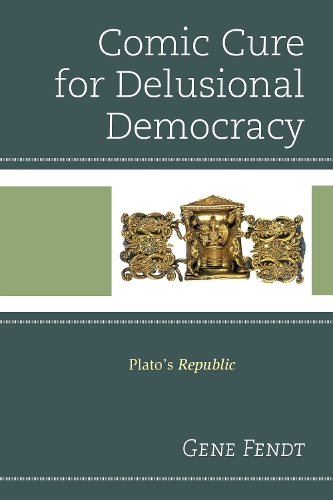
Comic Cure for Delusional Democracy: Plato's Republic
(Hardback)
Publishing Details
Comic Cure for Delusional Democracy: Plato's Republic
By (Author) Gene Fendt
Bloomsbury Publishing PLC
Lexington Books
16th July 2014
United States
Classifications
Professional and Scholarly
Non Fiction
Ancient Greek and Roman philosophy
Political science and theory
321.07
Physical Properties
Hardback
314
Width 161mm, Height 237mm, Spine 25mm
585g
Description
This book shows how the discussion of Platos' Republic is a comic mimetic cure for civic and psychic delusion. Plato creates such pharmaka, or noble lies, for reasons enunciated by Socrates within the discussion, but this indicates Plato must think his readers are in the position of needing the catharses such fictions produce. Socrates' interlocutors must be like us. Since cities are like souls, and souls come to be as they are through mimesis of desires, dreams, actions and thought patterns in the city, we should expect that political theorizing often suffers from madness as well. It does. Gene Fendt shows how contemporary political (and psychological) theory still suffers from the same delusion Socrates' interlocutors reveal in their discussion: a dream of autarchia called possessive individualism. Plato has good reason to think that only a mimetic, rather than a rational and philosophical, cure can work. Against many standard readings, Comic Cure for Delusional Democracy shows that the Republic itself is a defense of poetry; that kallipolis cannot be the best city and is not Socrates' ideal; that there are six forms of regime, not five; and that the true philosopher should not be unhappy to go back down into Plato's cave.
Reviews
Gene Fendt's book is a rereading and rethinking of the relation between our passions and our reason in the light of poetic nature of Plato's Republic. It is a book that searches for and sees the unity of the great Platonic work along with the inner relations that exist between city and soul. The 'missing' city of Fendt's argument is, perhaps, indicated in his introductory dedication: Ad majoren civitatis dei gloriam, with its overtones of both Augustine and Ignatius. -- James V. Schall, S.J., Georgetown University
Fendt offers a fresh reading of the Republic that allows Plato to speak in his own termsmimetic, dramatic, imagistic, ironic, comedic, and above all therapeuticrather than imposing an alien, analytic problematic on the text. The book unites philosophical insights and verbal sparklers in a manner true to the spirit of Plato himself. -- Eric Perl, Loyola Marymount University
In this compellingly readable new study, Gene Fendt shows that Plato is well aware that we cannot, as human beings, ever leave the psychic or political cave, nor ever have done with rhetorical persuasive power and the sway of poetic mimesis. Rather, if our cities and souls are to be cured, they must be touched in their force and desire by the wind of the intellect. Fendt's compelling and decisive argument has powerful implications for the re-reading of our western legacy. -- Catherine Pickstock, University of Cambridge
Many pages of the book are impressive in showing the familiarity of many long-lasting conversations about the Republic. * Interpretation *
Author Bio
Gene Fendt is Albertus Magnus Professor of philosophy at the University of Nebraska, Kearney.
